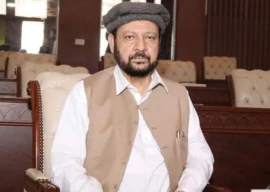
Balochistan lies on the migratory routes of very significant and biologically important wildlife populations. Among them, the houbara bustard, locally named as Charz or Talor, is very famous. The bird starts arriving into Balochistan when the temperature drops below freezing point in November to December. The bird returns back to its home in the middle of March or April.
The mass-hunting of the houbara starts in Balochistan with the commencement of winter by Arab dignitaries who have tacit approval in form of licences issued to them by the Ministry of Foreign Affairs. Among the dignitaries the Emirs of Kuwait and Qatar, the crown prince of Saudi Arabia and the President of UAE and their relatives, government officials, and businessmen are included.
While its hunting has been banned globally as it is an endangered bird species, hunters sadly hunt them down without any obstruction from the federal as well as provincial governments. Its population has been wiped out from the Arabian Peninsula and various other countries in the region due to its illicit hunting, according to the Convention of International Trade in Endangered Species (CITES). Efforts are being made by different Arab countries in collaboration with international organisations working on the protection and conservation of this bird by setting up breeding programs in order to revive its numbers.
While matters regarding forests and wildlife rest under the jurisdiction of provincial governments and concerned ministries, especially after the 18th Amendment came into effect, the Ministry of Foreign Affairs is active in inviting aforementioned hunters to come and enjoy hunting. 33 permits were issued to the Arab royals last year to kill 100 birds each in Pakistan. However, it is on the record that brutal mass-hunting of houbara bustards was carried out by Prince Fahd bin Sultan bin Abdul Aziz Al Saud in district Chagai of Balochistan, who hunted 2100 birds in 21 days despite having a license permit with a limit of 100 birds within a period of 10 days. This was reported by Jaffar Baloch, former divisional forest officer of Balochistan’s Forest and Wildlife Department.
This unique bird’s flesh is believed to have aphrodisiac properties, which is why it is on the brink of extinction in most Arabian countries due to its illicit hunting. In Balochistan, two kinds of houbara bustard are found, one indigenous and the other migratory. Nag Valley of Washuk district in Balochistan is the only place where the residential variety is found. A recent research has been conducted by wildlife conservationists of UAE, Kazakhstan, and Saudi Arabia, describing Nag Valley as the breeding home for houbara bustard.
Suggestions
It is the need of the hour that the concerned authorities take stern actions to revive the policy of issuing permits of killing the protected bird. Furthermore, the matter of issuing licences, if issued by the Ministry of Foreign Affairs, must be done in consultation with the provincial government.
These licences, granted to some 17 dignitaries, must be specific and allowed for sustainable hunting only. The bag limit should be reduced to 20 birds from 100 per hunter. The use of firearm must not be permitted in the protected and reserved areas. The number of hunted birds must be reported to the liaison officer from the concerned provincial wildlife department on a daily basis. The permit duration must be reduced to four days from ten days. The camp prepared for the Arab dignitaries in different hunting areas of Balochistan should be vacated soon after the hunter’s departure. Training of falconries should be avoided in the restricted reserved areas. Trapping, netting, taking live houbara bustards and their eggs and chicks should strictly be prohibited. There should be a strict ban on trans-boundary export of these birds from Balochistan to other countries. Only permissible hunting should be allowed in specified areas without damaging fauna and flora of the breeding habitat.
While the state wants to prove its hospitality in order to please dignitaries, it should not be done at the price of violating the national and international conventions meant for the protection and conservation of this internationally protected bird.
The author works as a Divisional Forest Officer at the Balochistan Forest and Wildlife Department, and is an expert in the ecology of the Houbara Bustard.
Published in The Express Tribune, November 19th, 2014.
COMMENTS (4)
Comments are moderated and generally will be posted if they are on-topic and not abusive.
For more information, please see our Comments FAQ

1722586547-0/Untitled-design-(73)1722586547-0-165x106.webp)


1732326457-0/prime-(1)1732326457-0-165x106.webp)












@Mohammad: No license should be issued for killing the endangered spices at any cost what will happen when these birds will be seen only in pictures by the way how much funds will be raised by issuing licenses and we know that that the stipulated condtions will not be adhered to as always killing 2100 words against 100.
good efforts by Media
very nice and outstanding effort to highlight this to the masses.
I seriously doubt the government of Pakistan will ONLY issue these licenses to do the favor to dignitaries. All over the world, government agencies allow hunting during hunting season to anyone who pay the price. Such practice and expensive licenses are issued on Terms and Conditions Applies basis and in order to raise the necessary funds for the welfare of endangered species.